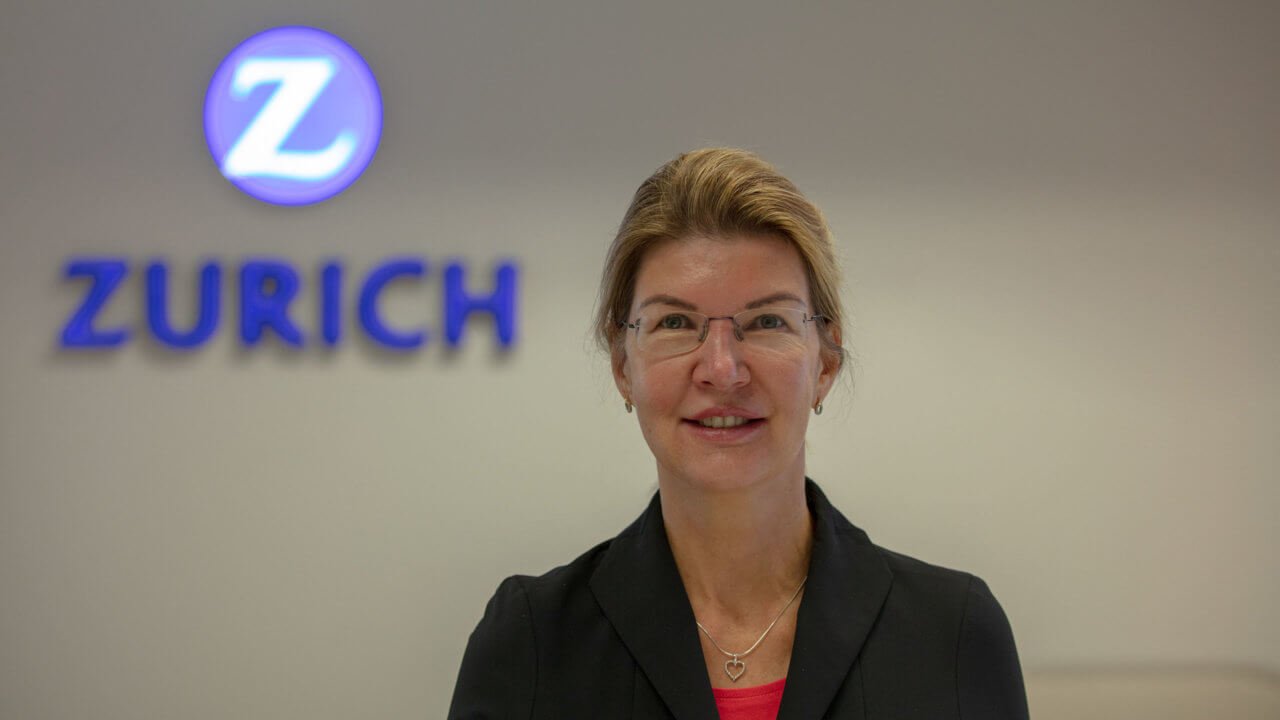Future-Proof Brand Series: Monika Schulze, Zurich Insurance
Marketing today is much more about data, digital customer journeys and influencing the sales funnel

VIM Group
Founded in 1872, Zurich Insurance is one of the world’s leading insurance companies. Their customers, who span across more than 210 countries and territories, range from individuals and small business to multinational corporations.
Holly Wilson spoke to their Global Head of Customer Experience & Digital Strategy, Monika Schulze, about the challenge of convincing leadership teams of the correlation between brand and business results, and how using the power of brand can increase sales.
Monika Schulze of Zurich Insurance
What is your biggest brand management challenge?
Monika Schulze: Everything a brand does – the way it appears in Google search or on a website, agent offices, claims, advertising and more – all play a role in shaping the customer’s experience. Focusing on customer experience management is in my eyes the single most important investment a brand can make in today’s competitive business environment.
To give a bit of context, here some numbers: today, 89% of companies compete primarily on the basis of customer experience – up from only 36% in 2010. But while 80% of companies believe they deliver “super experiences”, only 8% of customers agree.
One of my biggest challenges is convincing everybody that customer experience is important in driving business results. Historically, the insurance industry has been driven by underwriters and salespeople. The relationship to the customer has been mostly delegated to agents and brokers. The concept of the customer has been discussed, but it hasn’t been at the centre of marketing activities. The focus was on keeping the sales reps happy organising incentive travels to increase their sales targets.
As the concept of focusing on customer experience is relatively new, the question is how to change the culture of the company to focus more on the customer and demonstrate that there is a correlation between a positive customer experience and business results.
“One of the biggest challenges is to demonstrate the correlation between customer experience and business results.”
Holly Wilson: Are employees who aren’t in a marketing role starting to understand how valuable the customer is to the business?
MS: More and more people within the organisation are starting to understand how valuable the customer experience is to the business, but it’s a long process.
The Edelman Trust Barometer shows that trust in the insurance industry is very low, even compared to banks. This lack of trust is partly due to the low frequency of contact with customers. On average, it takes a year and a half for people to have contact with their insurance company after purchasing a policy. This means there is a long period of time where there is no touch point. Customers don’t have any relationship to the company, and there is a very low sense of loyalty, which means for most customers it’s relatively easy to switch provider. This is very evident in the motor insurance segment where price is a very important driver to stay or switch.
Is brand more important now than ever?
MS: For people to have trust in your company you need to be clear on what your brand stands for and you need to deliver the customer experience people are expecting from you.
The brand sets customer expectations for experience and customer experience is how well you deliver on those expectations. Be it customer service, product quality or just the way the customers feel about the companies they do business with, customer experience rises to the top and is the definitive factor on whether the customer will decide to keep doing business with you. Increasingly, companies are recognising the importance of delivering an experience that makes them stand out from their competition. There is a tremendous opportunity to disrupt a competitor or gain market share in an industry if you get the customer experience right.
What tools/technology do you use to manage your brand?
MS: If you want to be successful, you have to listen to your customers, as customer-perceived value is one of the leading drivers of business success. One of the tools we are using is the Net Promotor Score (NPS), which is a management tool used in customer experience programs. NPS measures the loyalty of customers to a company and it allows you to monitor improvements in a product, service or organisation.
This is complemented by Customer Journey Mapping which is a powerful way of visualising the customer experience over time. It helps identify gaps and points in the experience that are disjointed or painful.
As customers are given the experiences they want, satisfaction naturally increases. Moreover, as problems within the company are fixed and services are improved, employee confidence increases as well. Having a better understanding of a company’s practices and receiving extra support helps employees perform their roles with greater efficiency.

Which brands do you admire or use as inspiration?
MS: If you look at it in terms of business results, who are the successful brands? Take Apple, for example, the company grew from $29bn revenue in 2008 to $255bn in 2018 which is almost eight times as much. They put a big emphasis on NPS and the store managers are driven by NPS results. It is one of their key performance indicators and the minute a customer gives them a bad rating, the store manager must talk to the customer.
This is something we are now doing as well. We want to change the culture of our company to be more customer centric. This includes making sure that your employees believe in your brand and company. Employees can play a big role in brand advocacy and greatly influence the customer experience at many touch points.
“If you want to be a successful company you need to make sure that your employees believe in your brand and customer experience.”
HW: In your opinion, is there an example of a company where the employees are its ultimate champions?
MS: I like the Nokia example. Their aim is to know and understand the expectations of their employees and how they can keep them. They do so by sending lots of surveys throughout the year, and employees are encouraged to express any concerns or doubts. They also organise a lot of internal events and regularly communicate to make sure all employees understand what is going on, why certain decisions are being made and how employees are affected.
HW: Another interviewee in our Future-Proof Brand Series, Mark Evans from Direct Line Group, gave Maltesers as an example of a brand he admired, as they have tried to be more representative of society by including people with disabilities in their advertising. Personally, I really like the smoothie brand, Innocent, because their branding is fun and as a company they are very community focused. Do you have any brands which you admire?
MS: Yes, one of my favourite brands is Dove, because they managed to transform the brand from being about just soap and moisturiser, to fighting for the self-confidence of women. I think it displays an approach we can take to the insurance industry; to broaden the scope of the brand from a product focus by giving it meaning. Dove takes a clear stance against the model figures we are used seeing in advertising, by showing that all women and body-types are beautiful. So, the question is how can a brand own a topic which is relevant for society, fight for something which is important, and at the same time connect with the product and service portfolio?
“How can a brand own a topic which is relevant for society, fight for something which is very important, and at the same time connect with the product and service portfolio?”
People tend to believe that only facts and figures influence people in their decision making, especially in insurance companies. However, there is scientific evidence that shows that most of our decisions – even in business – are done on a non-rational, emotional basis. Therefore, it is important to develop an emotional hook as well as being very reliable in delivering a great customer experience during the whole customer journey.
How has your brand department changed over the past five years?
MS: Digital marketing capabilities are increasingly needed, and this is why we are working together with various partners to learn and improve. One of the partnerships I am personally involved in is CoverWallet, who specialise in small business insurance. At first, I was challenged why I wanted to partner with them, as their value proposition was seen as an IT front end. However, the convincing evidence was their lead generation ability and the high rates of conversion to sales. Marketing today is much less about traditional advertising and sponsorship deals, it is much more about data, digital customer journeys and influencing the sales funnel. Therefore, the skills in the marketing department need to gradually change and the awareness that we sometimes need support from outside has already increased significantly.
“Marketing today is much less about traditional advertising and sponsorship deals, it is much more about data, digital customer journeys and influencing the sales funnel.”
HW: How would you recommend raising your brand awareness using technology?
MS: One of our key pillars is our Thought Leadership Programme and partnerships with companies such as LinkedIn, Bloomberg and The Wall Street Journal. We want to produce high quality content and to also have the right channels to share the content with our key audiences.
Where do you see the future of brand management in five years’ time?
MS: The complexity of modern marketing is only going to keep increasing. While this is a big challenge, it’s also a good problem to have, as over the next years marketers will have an ever-growing customer base thanks to the growth of smartphones. This enables us to reach our customers directly, many for the first time.
The number one possession people have is their smartphone and mobile is the way people interact with friends and brands. The way they look at content is shifting to the small screen and successful companies will be able to create a more personalised experience with consumers.
In the future there will have to be a big focus on customer experience and customer journeys. You will need specialised people; for example, people who know what artificial intelligence is and people who understand technology so that you can use new applications like augmented reality and VR. You need people who can analyse data, find the right customer insights and translate them into actionable business results.
–
Monika Schulze is Global Head of Customer Experience & Digital Strategy at Zurich Insurance.
Read more interviews in the Future-Proof Brand Series.
Related insights
Brand Management
Rebranding
Brand Technology
Markengeflüster: Exchange on Brand Strategies and Challenges
Brand Management
Rebranding
Brand Technology
Markengeflüster: Austausch zu Markenstrategien und Herausforderungen
Brand Management
Rebranding
Brand Technology



